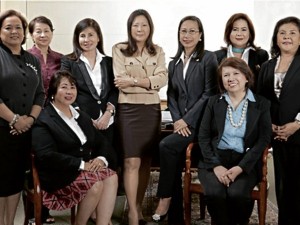Fewer Filipinas in boardrooms noted

The number of Filipina executives according to the 2013 Grant Thornton International Business Report has become fewer although they continue to enjoy a larger share of senior posts compared with women elsewhere in the world.
MANILA, Philippines—There are now fewer women lording over the boardrooms in the country than there were last year, according to a research paper from the Grant Thornton International Business Report (IBR).
Although the country has slipped in IBR’s global ranking that measures gender parity in top management posts, Filipinas continue to enjoy a larger share of senior posts compared with women elsewhere in the world, IBR said.
The paper revealed that 37 percent of senior posts in corporate Philippines are held by women, down by 2 percentage points from last year. This brings the country to the fifth spot in the 2013 global league table, falling from second place last year.
Ranking higher than the Philippines this year were China (51 percent), Poland (48 percent) and Latvia (43 percent). Sharing the fourth place were Estonia and Baltics (40 percent), based on results released by audit, tax, advisory and outsourcing services firm Punongbayan & Araullo (P&A), which is Grant Thornton’s partner firm.
In last year’s study, Russia topped the league with 46 percent while the Philippines, Botswana and Thailand shared second place with 39 percent.
Article continues after this advertisementBut globally, more women are making it into senior management posts than at any time since 2010. The 2013 IBR study said 24 percent of senior management positions were filled by women, up from 21 percent in 2012, and 20 percent in 2011.
Article continues after this advertisementDespite the drop in the global ranking, the Philippines remains significantly above the global average, and has the largest proportion of female top executives among the Asean countries that participated in the study.
In Malaysia, women held 26 percent of the top management posts. In Singapore, the proportion stood at 27 percent; Thailand, 36 percent; and Vietnam, 33 percent, the study said.
“When you look at the big picture, women in the Philippines are still in a better position compared to their counterparts in most other countries,” said Marivic Españo, chairperson and CEO of P&A. “These results tell us that 34 percent of our board of directors are women, compared to just 19 percent globally. So, it’s fair to say that Filipinas do have a voice in the upper echelon of the business community. We just have to be conscious of this proportion and make sure it doesn’t skew against women any further.”
This year, the survey also asked business leaders about the composition of their board of directors. In the Philippines, 81 percent of the respondents said they have a board of directors made up of an average of 6.85 people, of which an average of 2.31 are women.
About 39 percent of respondents also said that they have specific plans to hire or promote more women for senior management posts in the next 12 months while 44 percent said they would support the introduction of quotas for the number of women on executive boards of large listed companies.